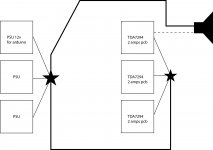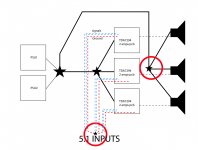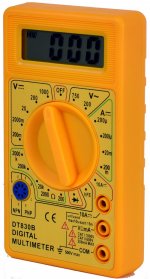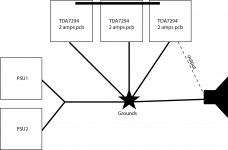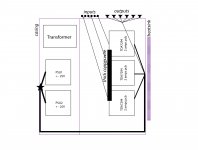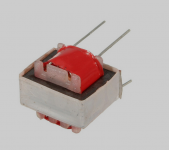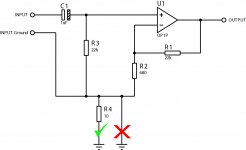hum with RCA (SOLVED)
Hi everyone,
UPDATE: Solution found see this post (post 17)
hum with RCA
I need some expert help as I am stuck and cannot find my answers on google. My setup is a 6 channel TDA7294 amps (2 per board = 3 boards),
Problem is that whenever I connect RCA to any device the hum starts coming from speakers. (not very loud but can be heard from 1-2 ft )
1. RCA is isolated from chasis,
2. we dont have earth connections here (yup)
3. even when I connect RCA to a portable mp3, hum starts coming (makes me wonder, how can loop be happening here)
4. I have tried connecting all input grounds to star ground , individual to their respective boards, but no use, as any external device is connected , hum is present)
Any advise please. Thankyou
Hi everyone,
UPDATE: Solution found see this post (post 17)
hum with RCA
I need some expert help as I am stuck and cannot find my answers on google. My setup is a 6 channel TDA7294 amps (2 per board = 3 boards),
Problem is that whenever I connect RCA to any device the hum starts coming from speakers. (not very loud but can be heard from 1-2 ft )
1. RCA is isolated from chasis,
2. we dont have earth connections here (yup)
3. even when I connect RCA to a portable mp3, hum starts coming (makes me wonder, how can loop be happening here)
4. I have tried connecting all input grounds to star ground , individual to their respective boards, but no use, as any external device is connected , hum is present)
Any advise please. Thankyou
Attachments
Last edited:
simplify first.
Work with one PSU and one amplifier and find if it behaves first with shorted input and then with an interconnect that is shorted at the far end and finally with an interconnect that is fitted to a source that is powered OFF and then powered ON.
Once you know how the simple mono behaves, then progress to adding on one stage at a time to find when the new problem occurs. Measure the Hum+Noise and output offset at each stage of testing so that you (and we) can compare results.
Work with one PSU and one amplifier and find if it behaves first with shorted input and then with an interconnect that is shorted at the far end and finally with an interconnect that is fitted to a source that is powered OFF and then powered ON.
Once you know how the simple mono behaves, then progress to adding on one stage at a time to find when the new problem occurs. Measure the Hum+Noise and output offset at each stage of testing so that you (and we) can compare results.
tried one star too. no difference.
single amp = less noise (audible 4-5 inch from speaker).
trying again though to further confirm.
single amp = less noise (audible 4-5 inch from speaker).
trying again though to further confirm.
just to add, the amps are dead silent when I disconnect input cables. Problems start when inputs are connected, as more channels are connected, more noise appears
Thanks you for responses, I have tried, as suggested, here are the results:
Amplifier board 1 / PSU 1 : Almost no sound only hearable from 2 inch from speaker, dc voltage on output = 5mv
Amplifier board 2 / PSU 1 : much more noise than single amp
Amplifier board 2 / PSU 2 : same as above
I am not sure about the red circles, kindly advise.
Amplifier board 1 / PSU 1 : Almost no sound only hearable from 2 inch from speaker, dc voltage on output = 5mv
Amplifier board 2 / PSU 1 : much more noise than single amp
Amplifier board 2 / PSU 2 : same as above
I am not sure about the red circles, kindly advise.
Attachments
the speaker return must not go back to the PSU charging node. Doing this will bring in avoidable hum and buzz.
What is the Hum+Noise measurement using the 199.9mVac scale of your DMM?
Do post6 tests a, b, or c, measure 0.1mVac, or 0.0mVac?
Each input to the 2channel amplifier should be two pairs of signal flow and signal return.
Adopting commoned Signal Returns will complicate your arrangement.
That's why I need to see your measurements for a single channel, then for two channels, so that we can identify the source of the hum due to an error in the wiring.
What is the Hum+Noise measurement using the 199.9mVac scale of your DMM?
Do post6 tests a, b, or c, measure 0.1mVac, or 0.0mVac?
Each input to the 2channel amplifier should be two pairs of signal flow and signal return.
Adopting commoned Signal Returns will complicate your arrangement.
That's why I need to see your measurements for a single channel, then for two channels, so that we can identify the source of the hum due to an error in the wiring.
Last edited:
Can you show a photo or schematic of the boards? Speaker return should go back to the amplifier. Your DMM is of no use for measuring low ac voltage I'm afraid
"1. RCA is isolated from chasis,
3. even when I connect RCA to a portable mp3, hum starts coming (makes me wonder, how can loop be happening here) "
Hi, I ran across your thread. From personal experience with a somewhat similar setup, including an isolated AC-DC suppy, I have seen this same behavior.
I've seen the same behavior with my Android device connected to the RCA cable to my amplifier. In my case, the cable seems to pick up radiated noise and the cable acts as an antenna, just as you're seeing.
3. even when I connect RCA to a portable mp3, hum starts coming (makes me wonder, how can loop be happening here) "
Hi, I ran across your thread. From personal experience with a somewhat similar setup, including an isolated AC-DC suppy, I have seen this same behavior.
I've seen the same behavior with my Android device connected to the RCA cable to my amplifier. In my case, the cable seems to pick up radiated noise and the cable acts as an antenna, just as you're seeing.
Hi again,
I did some more digging with fresh mind and stumbled upon this,
understanding star grounding
SOLUTION:
joined all three pcb grounds with thick copper wire.
RESULTS:
This reduces the hum quite a bit, to a level that OTHA (other half High authority) approves of it.
1. With RCA connected to amplifier BUT 3.5mm jack not connected to anything - Very very less sound almost audible 2 inch near speakers
2. With RCA connected to anything (even a turned off portable mp3 ) hum becomes bit audible. but since with AC, ceiling fan and other noise around it seems to merge with surroundings 😛
I think I will finish the project as it is for now 😛
and Thank you all for responding, its a great feeling to have guiding experts.
I did some more digging with fresh mind and stumbled upon this,
understanding star grounding
SOLUTION:
joined all three pcb grounds with thick copper wire.
RESULTS:
This reduces the hum quite a bit, to a level that OTHA (other half High authority) approves of it.
1. With RCA connected to amplifier BUT 3.5mm jack not connected to anything - Very very less sound almost audible 2 inch near speakers
2. With RCA connected to anything (even a turned off portable mp3 ) hum becomes bit audible. but since with AC, ceiling fan and other noise around it seems to merge with surroundings 😛
I think I will finish the project as it is for now 😛
and Thank you all for responding, its a great feeling to have guiding experts.
Attachments
"1. RCA is isolated from chasis,
3. even when I connect RCA to a portable mp3, hum starts coming (makes me wonder, how can loop be happening here) "
Hi, I ran across your thread. From personal experience with a somewhat similar setup, including an isolated AC-DC suppy, I have seen this same behavior.
I've seen the same behavior with my Android device connected to the RCA cable to my amplifier. In my case, the cable seems to pick up radiated noise and the cable acts as an antenna, just as you're seeing.
I have 4 RCA cables, I tried all, dosent looks like cable issue., even when RCA connected to amplifier, but the 3.5mm jack not connected to anything, its Very quiet.
What are the two PSU? Are they positive and negative or something else? As already mentioned, the speaker returns connect to the amp boards.
Did you connect PE to the chassis?
How about posting some photos.
Did you connect PE to the chassis?
How about posting some photos.
a single channel amplifier needs a two wire input connection and it also needs a two wire output connection.
If you have a 2channel amplifier then you need to double that. It needs 2 sets of two wire input connections and 2 sets of two wire output connections.
That adds up top 8 signal wires to be connected for a 2channel amplifier. Then add on the three wires of the dual polarity supply. Now you have at least 11 wires.
Removing any of those wires forces the current to find another route, or simply breaks the circuit.
Forcing the current to find another route that is not close coupled to the original route will increase interference.
If you have a 2channel amplifier then you need to double that. It needs 2 sets of two wire input connections and 2 sets of two wire output connections.
That adds up top 8 signal wires to be connected for a 2channel amplifier. Then add on the three wires of the dual polarity supply. Now you have at least 11 wires.
Removing any of those wires forces the current to find another route, or simply breaks the circuit.
Forcing the current to find another route that is not close coupled to the original route will increase interference.
SOLVED
first thing first, sad to hear, may AndrewT rest in peace.
Secondly. its been nine months since I posted this, (improved bit in pcb making skills and overall electronics understanding as a hibbyist)
PROBLEM:
I was stuck with faint hum, which was not obvious with day time noise, but irritating in night, and like all said I thought i made mistakes in making pcb or wiring the most obvious replies you may see if you search for looping hum.
It was frustrating to look for answers because even in amplifier design books sample pcbs, there was no such thing as strict star ground as often suggested in forum. which made me question how can these gurus not making strict Star ground as seen echoing throughout audio forums.
Turns out it was not anything i did wrong nor was it a wiring issue, its
Drumm rooool
"cross channel loop"
which is when the loop created in signal return path of inputs.
Solution
add resistance between signal ground and amp ground by using 4-10 ohm "Hum Breaking resistor"
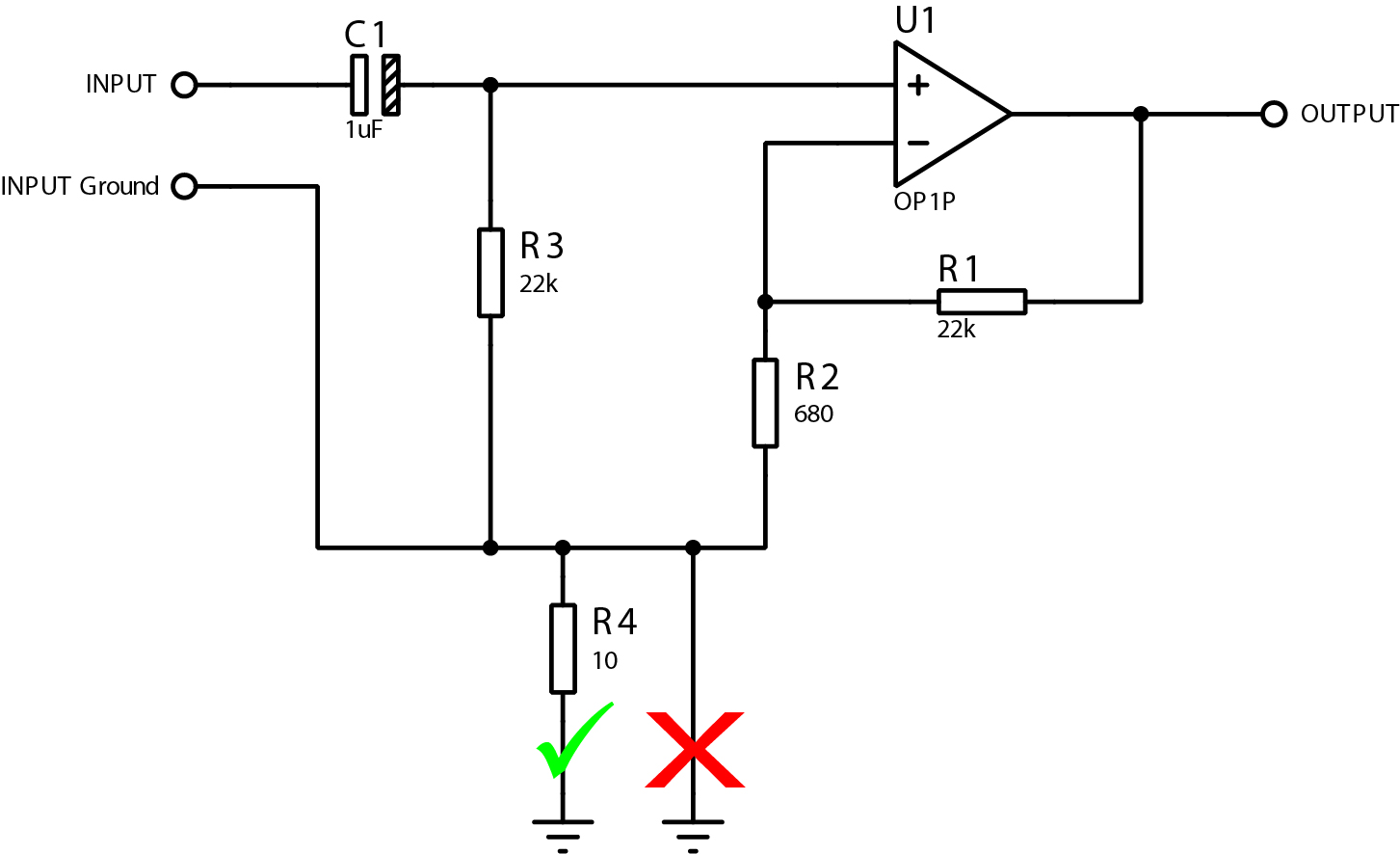
See post 65 (marked red lines)
Rod Elliot P3A amp noises
Lovely explained here
Rod Elliot P3A amp noises
and here (page 28)
404 Not Found
or here too (page 4)
https://www.updatemydynaco.com/documents/GroundingProblemsRev1p4.pdf
first thing first, sad to hear, may AndrewT rest in peace.
Secondly. its been nine months since I posted this, (improved bit in pcb making skills and overall electronics understanding as a hibbyist)
PROBLEM:
I was stuck with faint hum, which was not obvious with day time noise, but irritating in night, and like all said I thought i made mistakes in making pcb or wiring the most obvious replies you may see if you search for looping hum.
It was frustrating to look for answers because even in amplifier design books sample pcbs, there was no such thing as strict star ground as often suggested in forum. which made me question how can these gurus not making strict Star ground as seen echoing throughout audio forums.
Turns out it was not anything i did wrong nor was it a wiring issue, its
Drumm rooool
"cross channel loop"
which is when the loop created in signal return path of inputs.
Solution
add resistance between signal ground and amp ground by using 4-10 ohm "Hum Breaking resistor"
See post 65 (marked red lines)
Rod Elliot P3A amp noises
Lovely explained here
Rod Elliot P3A amp noises
and here (page 28)
404 Not Found
or here too (page 4)
https://www.updatemydynaco.com/documents/GroundingProblemsRev1p4.pdf
Attachments
Last edited:
- Status
- Not open for further replies.
- Home
- Amplifiers
- Chip Amps
- hum with RCA
